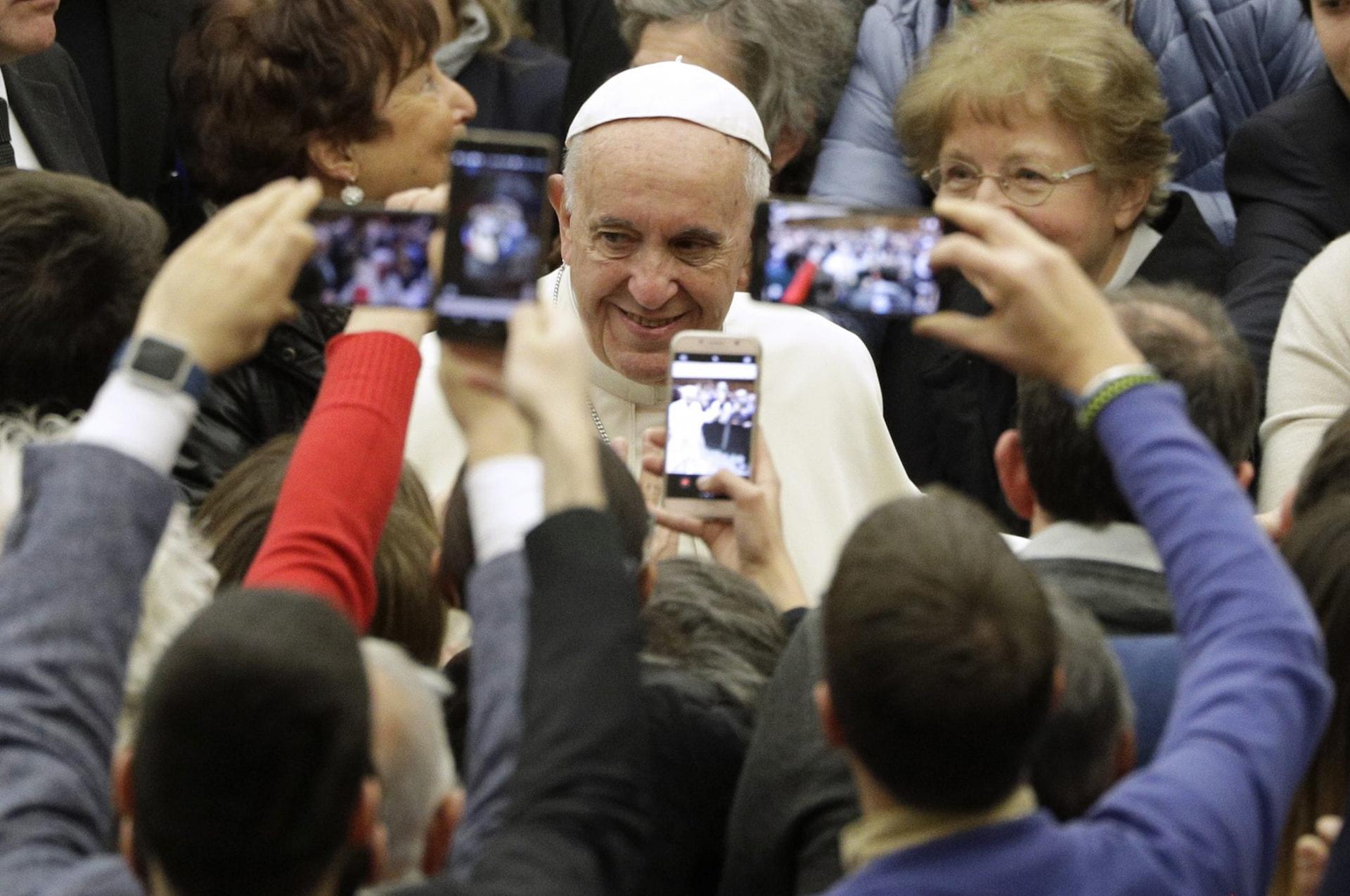ROME – After a somber Pope Francis warned cardinals and other senior officials of the Vatican bureaucracy on Thursday against what he called the “cancer” of ambition and “betrayers of trust” eating away at reform, it was a more relaxed and up-beat pope who greeted the workers of the Vatican City State later in the morning.
Francis spent almost a half-hour as he entered the Paul VI Audience Hall greeting the people who sweep the Vatican’s streets, cure its gardens, run its phone center and staff its shops, as well as staffers in agencies such as Vatican Radio and the Vatican Museums. He kissed babies, blessed rosaries, signed Christmas cards – and, inevitably, posed for selfies.
At one stage, the pontiff swapped the white zucchetto on his head for a new one being sported by a young girl held aloft by her father.
The family atmosphere, however, didn’t stop Francis from turning serious at one point, conceding that the Vatican “has a problem” when it comes to how its workers are sometimes treated.
Quoting a lady he’d met on his way into the hall, Francis said she asked him to “take care of workers whose jobs are precarious.”
The pontiff then said he’d recently had a meeting with Cardinal Reinhard Marx of Munich, Germany, who heads the new Council for the Economy, intended to set financial policy for the Vatican.
“I told Cardinal Marx, I don’t want any under-the-table jobs in the Vatican,” Francis said, drawing strong applause from the crowd.
He then more or less apologized for the way a measure adopted in 2014, intended to cut costs by imposing a hiring freeze except for natural attrition, allowed “volunteers” to be used to make up for missing personnel.
In practice, that’s led to a wider use of part-time contracts, generally intended for members of religious orders pressed into Vatican service for a limited period of time. Those positions generally come with lower salaries, no guarantee of continued employment, and little opportunity for advancement.
Francis said that measure “was valid as a try for one or two years,” but “no more.”
“We must not leave people jobless, or frozen in place,” he said, again to strong applause.
“We have to work here, on the inside, to be sure there are no precarious jobs and no precarious workers,” he said.
“It’s a problem of conscience,” Francis said. “I can’t go out and proclaim the social teaching of the Church, and then do these things here.” He urged the Vatican’s work force to help him in that effort – including, he said pointedly, the “superiors” in the system.
Francis’s word Thursday morning built on a long record of criticizing under-the-table work and exploitation of workers’ rights. Earlier this year, for instance, during the Social Week organized by the Italian bishops’ conference, Francis referred to such arrangements as “immoral” and said they’re deadly for “dignity, health, the family, and society.”
Speaking without notes, the pope then offered brief reflections on three other key ideas – the family, workplace gossip, and forgiveness.
As he has many times before, Francis defined gossip as a kind of terrorism: “Like the terrorist, the one who gossips tosses a bomb and then walks away, and when it explodes it hurts everyone else,” he said.
In a bit of homespun pastoral wisdom, Francis asked his audience a rhetorical question: “How to avoid gossip? Bite your tongue!” he said, emphasizing again, “bite your tongue!”
That line too played to strong applause.
On forgiveness, Francis urged the Vatican’s workers to find a “good confessor” over Christmas to do a “clean-up on the inside,” saying it’s healthy for everyone, and that he also makes a point of making a Christmas confession.
“Sometimes it’s said that the best confessor is a priest who’s deaf,” Francis joked. “There aren’t many deaf priests, but there are plenty who are merciful … find one,” he said.
Francis then apologized for the bad example sometimes given to the lay employees of the Vatican by the clergy, saying that clergy sometimes are guilty of “sin, injustices, treating people poorly … we can be a little neurotic,” adding that he’s no exception, asking for forgiveness in his own name as well.
Francis then wished everyone a merry Christmas, “in your heart, in your family, and in your conscience.”
“Don’t be afraid,” Francis closed, referring to the importance of confession. “Christmas is a good opportunity to make peace inside ourselves.”














